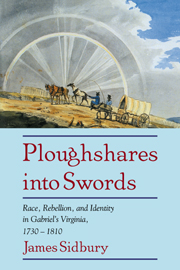Book contents
- Frontmatter
- Contents
- Acknowledgments
- Introduction
- Prologue: From Blacks in Virginia to Black Virginians
- 1 The emergence of racial consciousness in eighteenth-century Virginia
- Part I Cultural process: Creolization, appropriation, and collective identity in Gabriel's Virginia
- Part II Social practice: Urbanization, commercialization, and identity in the daily life of Gabriel's Richmond
- Epilogue: Gabriel and Richmond in historical and fictional time
- Appendix: Richmond households in 1784 and 1810
- Index
Part I - Cultural process: Creolization, appropriation, and collective identity in Gabriel's Virginia
Published online by Cambridge University Press: 04 August 2010
- Frontmatter
- Contents
- Acknowledgments
- Introduction
- Prologue: From Blacks in Virginia to Black Virginians
- 1 The emergence of racial consciousness in eighteenth-century Virginia
- Part I Cultural process: Creolization, appropriation, and collective identity in Gabriel's Virginia
- Part II Social practice: Urbanization, commercialization, and identity in the daily life of Gabriel's Richmond
- Epilogue: Gabriel and Richmond in historical and fictional time
- Appendix: Richmond households in 1784 and 1810
- Index
Summary
During the summer of 1800, Creole slaves from the Richmond area built a fraternal movement to overthrow slavery. The planned insurrection was betrayed and crushed, but the trials of conspirators created an unusual forum in which enslaved Virginians' discussions about their history, their present lives, and their future possibilities were recorded in official records. By the end of the eighteenth century, Virginians of African and European descent had developed overlapping and distinctly Virginian ways of communicating authority, of interpreting the state's revolutionary tradition, and of understanding their relations to the supernatural. These cultures with complicated and intertwined roots in Africa, America, and Europe had grown in a society built on racial inequality and slavery. Gabriel and his followers engaged in creative acts of cultural appropriation through which they reconstituted the meanings associated with shared elements of these cultures, building a movement to destroy the racist foundations of Virginia's society. Ultimately, however, two members of the brotherhood turned on the conspiracy, informed White Virginians of the approaching insurrection, and were granted freedom. To understand Gabriel's Virginia entails understanding the conspirators' attempt to win freedom, but it also entails understanding the betrayers' relationship to the world that spawned the conspiracy. The informers' lives uncover the rich and contradictory tension between communal and individualistic impulses among Virginians of African descent. The betrayers won their freedom but at the cost of their comrades' lives and of a place within enslaved Virginians' communal memories.
- Type
- Chapter
- Information
- Ploughshares into SwordsRace, Rebellion, and Identity in Gabriel's Virginia, 1730–1810, pp. 51 - 54Publisher: Cambridge University PressPrint publication year: 1997



